Bono
Appearance

Paul David Hewson, KBE, OL (born 10 May 1960) is an Irish musician and social activist, who after being nicknamed Bono Vox, became famous as the lead singer of the Irish rock band, U2 using the stage name Bono.
- See also:
Quotes
[edit]
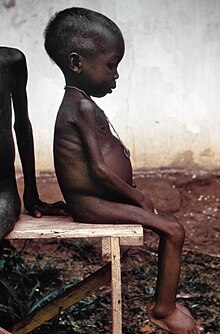

- When we were growing up, the 45 single was the heart of rock-and-roll and in many regards still is. It's the hardest thing to pull off. The surest sign that a band is growing stale and running out of creative ideas is when it turns to prog. And I well remember the 1970s when prog almost destroyed rock music. It's the mold growing on a congealed band on its last legs. Indeed, it still lurks among us in new, insidious forms like indie. The few times U2 has attempted prog, we've tempered it with good songwriting.
- Rock n roll stops the traffic
- Message spray-painted onto the Vaillancourt fountain during a free concert in San Francisco (11 November 1987)
- It is fair to say that we overreacted a bit. … Its not really worth defending my action, I did it in the spirit of the concert, and I thought I did it in the spirit of the artist's work, and he agreed — but, in fact he didn't own his work anymore, as most artists are prone to , he'd sold it, and the City of San Francisco owned it, and they didn't like what I did at all. … Its a really wild thing, you know, you're in Rock n Roll band — you know, I happen to sell millions of records — people therefore think that makes you a responsible citizen — this is not true. … I think this is one of the more mild actions of tour-madness. … It's the music that is magical with U2. … I don't mind being arrested for putting on a free concert, but I don't want to be arrested for being a vandal. I am a vandal and I do regret what I did. I really do regret it. It was dumb.
- On reactions to his spray painting the fountain at the free concert he gave in San Francisco, in a Press conference (November 1987)
- What a city, what a night, what a crowd, what a bomb, what a mistake, what a wanker you have for a President.
- Acceptance speech at the MTV Europe Music Awards, referring to French nuclear testing in Pacific (1995)
- It's an amazing thing to think that ours is the first generation in history that really can end extreme poverty, the kind that means a child dies for lack of food in its belly. That should be seen as the most incredible, historic opportunity but instead it's become a millstone around our necks. We let our own pathetic excuses about how it's "difficult" justify our own inaction. Be honest. We have the science, the technology, and the wealth. What we don't have is the will, and that's not a reason that history will accept.
- In an interview to the World Association of Newspapers for World Press Freedom Day (3 May 2004)
- We can be the generation that no longer accepts that an accident of latitude determines whether a child lives or dies. But will we be that generation?
- Foreword to The End of Poverty (2005) by Jeffrey Sachs
- Can you imagine your second album — the difficult second album — it's about God? Everyone is tearing their hair out and Chris Blackwell says, "It's okay. There's Bob Marley and Marvin Gaye, Bob Dylan, it's a tradition. We can get through it.
- About the album October (album) (1981) in a speech accepting induction to the Rock and Roll Hall of Fame (17 March 2005)
- The thing about The Dubliners is — line'em up, the hardest rock'n'roll bands in the world, AC/DC, Led Zeppelin, The Who, Oasis, Nirvana, U2 — we're all a bunch of girls next to The Dubliners.
- As quoted on Ronnie Drew (2008), talking about Irish folk band The Dubliners
- All That You Can't Leave Behind and How To Dismantle An Atomic Bomb are both really mad long titles. As I've just said them, I've just realised how ridiculous the titles are.
- CNN Interview, after the 2006 Grammys (9 February 2006)
- Your president leads the world in the cause of freedom right now. ... The people in Ukraine are not just fighting for your own freedom, you are fighting for all of us who love freedom. … We pray that you will enjoy some of that peace soon.
Rattle and Hum (1987)
[edit]
- Quotes from the rockumentary film.
- Well, here we are, the Irish in America. The Irish have been coming to America for years, going back to the great famine when the Irish were on the run from starvation and a British Government that couldn't care less. Right up to today, you know, there are more Irish immigrants here in America today than ever — some illegal, some legal. A lot of them are just running from high unemployment, some run from the Troubles in Northern Ireland, from the hatred of the H Blocks, torture. Others from wild acts of terrorism like we had today in a town called Enniskillen, where eleven people lie dead, and many more injured, on a Sunday Bloody Sunday.
- Statements made before a live performance of Sunday Bloody Sunday, a song first recorded on the U2 album War (1983)
- Let me tell you something. I've had enough of Irish Americans who haven't been back to their country in twenty or thirty years come up to me and talk about the resistance, the revolution back home; and the glory of the revolution, and the glory of dying for the revolution. Fuck the revolution! They don't talk about the glory of killing for the revolution. What's the glory of taking a man from his bed and gunning him down in front of his wife and his children? Where's the glory in that? Where's the glory of bombing a Remembrance Day parade of old-age-pensioners, their medals taken out and polished up for the day? Where's the glory in that? To leave them dying, or crippled for life, or dead, under the rubble of the revolution that the majority of the people in my country don't want. No more! Sing No more!
CNN Larry King Weekend (2002)
[edit]- "We used to say, 'They have everything, but it.' We had nothing, but it".
- "I am saying we are great. I'm not saying I'm great. There's a difference..."
- "Ireland has a very different attitude to success than a lot of places, certainly than over here in the United States. In the United States, you look at the guy that lives in the mansion on the hill, and you think, you know, one day, if I work really hard, I could live in that mansion. In Ireland, people look up at the guy in the mansion on the hill and go, one day, I'm going to get that bastard. It's a different mind-set."
- "Who in Ireland could have too much respect for organized religion? We've seen it tear our country in two. My mother was a Protestant. My father was a Catholic. And I learned that religion is often the enemy of God, actually."
- "religion is the artifice, you know, the building, after God has left it sometimes, like Elvis has left the building. You hold onto religion, you know, rules, regulations, traditions. I think what God is interested in is people's hearts, and that's hard enough."
- "This moment in time will be remembered for three things: the war against terror, sure; the Internet, probably; and how we let an entire continent, Africa, burst into flames and stood around with water in cans."
- "Great ideas and great melodies have a lot in common"
- "It's much harder to be relevant than it is to be successful"
- "I've never left Ireland, really, you know you come here, come to America, I mean for Irish people America is kind of a promise land" … "It's the milk and honey ya know and we've always had this feeling for this country and the country I think has a feeling for our band"
PENN Address (2004)
[edit]- Commencement Address at the University of Pennsylvania (17 May 2004) RealPlayer video (Bono introduced at 1:50:30, speaks from 1:56:00 - 2:22:00)


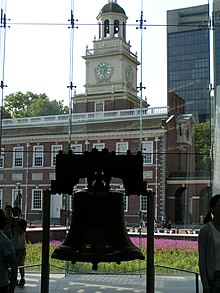
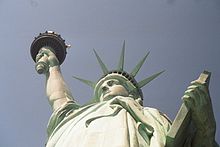

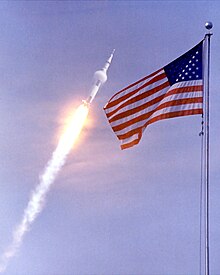

- My name is Bono and I am a rock star.
- An allusion to Apple Computer's "switch" commercials, which ended with such statements.
- Don't get me too excited because I use four letter words when I get excited.
I'd just like to say to the parents, your children are safe, your country is safe, the FCC has taught me a lesson and the only four letter word I'm going to use today is P-E-N-N. Come to think of it 'Bono' is a four-letter word. The whole business of obscenity — I don't think there's anything certainly more unseemly than the sight of a rock star in academic robes. It's a bit like when people put their King Charles spaniels in little tartan sweats and hats. It's not natural, and it doesn't make the dog any smarter.
- I have to come clean; I've broken a lot of laws, and the ones I haven't I've certainly thought about. I have sinned in thought, word, and deed. God forgive me. Actually God forgave me, but why would you? I'm here getting a doctorate, getting respectable, getting in the good graces of the powers that be, I hope it sends you students a powerful message: Crime does pay.
- So I humbly accept the honor, keeping in mind the words of a British playwright, John Mortimer it was, "No brilliance is needed in the law. Nothing but common sense and relatively clean fingernails." Well at best I've got one of the two of those.
- I didn't expect change to come so slow, so agonizingly slow. I didn't realize that the biggest obstacle to political and social progress wasn't the Free Masons, or the Establishment, or the boot heel of whatever you consider 'the Man' to be, it was something much more subtle. As the Provost just referred to, a combination of our own indifference and the Kafkaesque labyrinth of 'no's you encounter as people vanish down the corridors of bureaucracy.
- There's a truly great Irish poet. His name is Brendan Kennelly, and he has this epic poem called the Book of Judas, and there's a line in that poem that never leaves my mind, it says: "If you want to serve the age, betray it." What does that mean, to betray the age?
Well to me betraying the age means exposing its conceits, it's foibles; it's phony moral certitudes. It means telling the secrets of the age and facing harsher truths.
- Every age has its massive moral blind spots. We might not see them, but our children will. Slavery was one of them and the people who best served that age were the ones who called it as it was — which was ungodly and inhuman. Ben Franklin called it what it was when he became president of the Pennsylvania Abolition Society.
- Segregation. There was another one. America sees this now but it took a civil rights movement to betray their age. And 50 years ago the U.S. Supreme Court betrayed the age May 17, 1954, Brown vs. Board of Education came down and put the lie to the idea that separate can ever really be equal. Amen to that.
- What are the ideas right now worth betraying? What are the lies we tell ourselves now?
- Africa makes a mockery of what we say, at least what I say, about equality and questions our pieties and our commitments because there's no way to look at what's happening over there and it's effect on all of us and conclude that we actually consider Africans as our equals before God. There is no chance.
- We used to wake up in the morning and the mist would be lifting we'd see thousands and thousands of people who'd been walking all night to our food station were we were working. One man — I was standing outside talking to the translator — had this beautiful boy and he was saying to me in Amharic, I think it was, I said I can't understand what he's saying, and this nurse who spoke English and Amharic said to me, he's saying will you take his son. He's saying please take his son, he would be a great son for you. I was looking puzzled and he said, "You must take my son because if you don't take my son, my son will surely die. If you take him he will go back to Ireland and get an education." Probably like the ones we're talking about today. I had to say no, that was the rules there and I walked away from that man, I've never really walked away from it. But I think about that boy and that man and that's when I started this journey that's brought me here into this stadium.
Because at that moment I became the worst scourge on God's green earth, a rock star with a cause. Christ! Except it isn't the cause. Seven thousand Africans dying every day of preventable, treatable disease like AIDS? That's not a cause, that's an emergency.
- 20 years on I'm not that interested in charity. I'm interested in justice. There's a difference. Africa needs justice as much as it needs charity.
Equality for Africa is a big idea. It's a big expensive idea.
- The scale of the suffering and the scope of the commitment they often numb us into a kind of indifference. Wishing for the end to AIDS and extreme poverty in Africa is like wishing that gravity didn't make things so damn heavy. We can wish it, but what the hell can we do about it?
Well, more than we think. We can't fix every problem — corruption, natural calamities are part of the picture here — but the ones we can we must. The debt burden, as I say, unfair trade, as I say, sharing our knowledge, the intellectual copyright for lifesaving drugs in a crisis, we can do that. And because we can, we must. Because we can, we must. Amen.
- This is the straight truth, the righteous truth. It's not a theory, it's a fact. The fact is that this generation — yours, my generation — that can look at the poverty, we're the first generation that can look at poverty and disease, look across the ocean to Africa and say with a straight face, we can be the first to end this sort of stupid extreme poverty, where in the world of plenty, a child can die for lack of food in it's belly. We can be the first generation. It might take a while, but we can be that generation that says no to stupid poverty. It's a fact, the economists confirm it. It's an expensive fact but, cheaper than say the Marshall Plan that saved Europe from communism and fascism. And cheaper I would argue than fighting wave after wave of terrorism's new recruits.
- It's a fact. So why aren't we pumping our fists in the air and cheering about it? Well probably because when we admit we can do something about it, we've got to do something about it. For the first time in history we have the know how, we have the cash, we have the lifesaving drugs, but do we have the will?
- Yesterday, here in Philadelphia, at the Liberty Bell, I met a lot of Americans who do have the will. From arch-religious conservatives to young secular radicals, I just felt an incredible overpowering sense that this was possible. We're calling it the ONE campaign, to put an end to AIDS and extreme poverty in Africa. They believe we can do it, so do I.
- I really, really do believe it. I just want you to know, I think this is obvious, but I'm not really going in for the warm fuzzy feeling thing, I'm not a hippy, I do not have flowers in my hair, I come from punk rock, The Clash wore army boots not Birkenstocks. I believe America can do this! I believe that this generation can do this. In fact I want to hear an argument about why we shouldn't.
- I know idealism is not playing on the radio right now, you don't see it on TV, irony is on heavy rotation, the knowingness, the smirk, the tired joke. I've tried them all out but I'll tell you this, outside this campus — and even inside it — idealism is under siege beset by materialism, narcissism and all the other isms of indifference. Baggism, Shaggism. Raggism. Notism, graduationism, chismism, I don't know. Where's John Lennon when you need him?
- It's not everywhere in fashion these days, Americanism. Not very big in Europe, truth be told. No less on Ivy League college campuses. But it all depends on your definition of Americanism.
Me, I'm in love with this country called America. I'm a huge fan of America, I'm one of those annoying fans, you know the ones that read the CD notes and follow you into bathrooms and ask you all kinds of annoying questions about why you didn't live up to that...
I'm that kind of fan. I read the Declaration of Independence and I've read the Constitution of the United States, and they are some liner notes, dude. As I said yesterday I made my pilgrimage to Independence Hall, and I love America because America is not just a country, it's an idea.
- America is an idea, but it's an idea that brings with it some baggage, like power brings responsibility. It's an idea that brings with it equality, but equality even though it's the highest calling, is the hardest to reach. The idea that anything is possible, that's one of the reasons why I'm a fan of America. It's like hey, look there's the moon up there, lets take a walk on it, bring back a piece of it. That's the kind of America that I'm a fan of.
- When the potatoes ran out, millions of Irish men, women and children packed their bags got on a boat and showed up right here. And we're still doing it. We're not even starving anymore, loads of potatoes. In fact if there's any Irish out there, I've breaking news from Dublin, the potato famine is over you can come home now. But why are we still showing up? Because we love the idea of America.
We love the crackle and the hustle, we love the spirit that gives the finger to fate, the spirit that says there's no hurdle we can't clear and no problem we can't fix.
- Every era has its defining struggle and the fate of Africa is one of ours. It's not the only one, but in the history books it's easily going to make the top five, what we did or what we did not do. It's a proving ground, as I said earlier, for the idea of equality. But whether it's this or something else, I hope you'll pick a fight and get in it. Get your boots dirty, get rough, steel your courage with a final drink there at Smoky Joe's, one last primal scream and go.
- Sing the melody line you hear in your own head. Remember, you don't owe anybody any explanations, you don't owe your parents any explanations, you don't owe your professors any explanations.
- You know I used to think the future was solid or fixed, something you inherited like an old building that you move into when the previous generation moves out or gets chased out. But it's not. The future is not fixed, it's fluid.
- The world is more malleable than you think and it's waiting for you to hammer it into shape.
- Remember what John Adams said about Ben Franklin, "He does not hesitate at our boldest Measures but rather seems to think us too irresolute."
Well, this is the time for bold measures.
Rolling Stone interview (2005)
[edit]- Interview in Rolling Stone magazine, No. 986 (3 November 2005)




- I'm the Imelda Marcos of sunglasses.... Very sensitive eyes to light. If somebody takes my photograph, I will see the flash for the rest of the day. My right eye swells up. I've a blockage there, so that my eyes go red a lot. So it's part vanity, it's part privacy and part sensitivity.
- On his sunglasses; Imelda Marcos famously had a huge collection of shoes.
- We had a street gang that was very vivid — very surreal. We were fans of Monty Python. We'd put on performances in the city center of Dublin. I'd get on the bus with a stepladder and an electric drill. Mad shit. Humor became our weapon. Just stand there, quiet — with the drill in my hand. Stupid teenage shit.
- We could defend ourselves. But even though some of us became pretty good at violence ourselves, others didn't. They got the shit kicked out of 'em. I thought that was kind of normal. I can remember incredible street battles. I remember one madster with an iron bar, just trying to bring it down on my skull as hard as he possibly could, and holding up a dustbin lid, which saved my life. Teenage kids have no sense of mortality — yours or theirs.
- You know that Johnny Cash song "A Boy Named Sue" where he gives the kid a girl's name, and the kid is beaten up at every stage in his life by macho guys, but in the end he becomes the toughest man. … By not encouraging me to be a musician, even though that's all he ever wanted to be, he's made me one. By telling me never to have big dreams or else, that to dream is to be disappointed, he made me have big dreams. By telling me that the band would only last five minutes or ten minutes — we're still here.
- On his father
- I really remember John Lennon's Imagine. I guess I'm twelve; that's one of my first albums. That really set fire to me. It was like he was whispering in your ear — his ideas of what's possible. Different ways of seeing the world.
- I was in my room listening on headphones on a tape recorder. It's very intimate. It's like talking to somebody on the phone, like talking to John Lennon on the phone. I'm not exaggerating to say that. This music changed the shape of the room. It changed the shape of the world outside the room; the way you looked out the window and what you were looking at.
I remember John singing "Oh My Love." It's like a little hymn. It's certainly a prayer of some kind — even if he was an atheist. "Oh, my love/For the first time in my life/My eyes can see/I see the wind/Oh, I see the trees/Everything is clear in our world." For me it was like he was talking about the veil lifting off, the scales falling from the eyes. Seeing out the window with a new clarity that love brings you. I remember that feeling.
Yoko came up to me when I was in my twenties, and she put her hand on me and she said, "You are John's son." What an amazing compliment!
- What's interesting is, in the months leading up to this, I was probably at the lowest ebb in my life. I was feeling just teenage angst. I didn't know if I wanted to continue living — that kind of despair. I was praying to a God I didn't know was listening.
- On the forming of the band U2
- We actually aren't able to play other people's songs. The one Stones song we tried to play was "Jumpin' Jack Flash." It was really bad. So we started writing our own — it was easier.
- Bowie was much more responsible for the aesthetic of punk rock than he's been given credit for, like, in fact, most interesting things in the Seventies and Eighties.
- When John Lennon sings, "Oh, my love/For the first time in my life/My eyes are wide open" — these songs have an intimacy for me that's not just between people, I realize now, not just sexual intimacy. A spiritual intimacy.
- The music that really turns me on is either running toward God or away from God. Both recognize the pivot, that God is at the center of the jaunt.
- So now — cut to 1980. Irish rock group, who've been through the fire of a certain kind of revival, a Christian-type revival, go to America. Turn on the TV the night you arrive, and there's all these people talking from the Scriptures. But they're quite obviously raving lunatics.
Suddenly you go, what's this? And you change the channel. There's another one. You change the channel, and there's another secondhand-car salesman. You think, oh, my God. But their words sound so similar . . . to the words out of our mouths.
So what happens? You learn to shut up. You say, whoa, what's this going on? You go oddly still and quiet. If you talk like this around here, people will think you're one of those. And you realize that these are the traders — as in t-r-a-d-e-r-s — in the temple.
- If I could put it simply, I would say that I believe there's a force of love and logic in the world, a force of love and logic behind the universe. And I believe in the poetic genius of a creator who would choose to express such unfathomable power as a child born in "straw poverty"; i.e., the story of Christ makes sense to me. … As an artist, I see the poetry of it. It's so brilliant. That this scale of creation, and the unfathomable universe, should describe itself in such vulnerability, as a child. That is mind-blowing to me. I guess that would make me a Christian. Although I don't use the label, because it is so very hard to live up to. I feel like I'm the worst example of it, so I just kinda keep my mouth shut. … I try to take time out of every day, in prayer and meditation. I feel as at home in a Catholic cathedral as in a revival tent. I also have enormous respect for my friends who are atheists, most of whom are, and the courage it takes not to believe.
- These are hard subjects to talk about because you can sound like such a dickhead. I'm the sort of character who's got to have an anchor. I want to be around immovable objects. I want to build my house on a rock, because even if the waters are not high around the house, I'm going to bring back a storm. I have that in me. So it's sort of underpinning for me.
- I'm wary of faith outside of actions. I'm wary of religiosity that ignores the wider world. In 2001, only seven percent of evangelicals polled felt it incumbent upon themselves to respond to the AIDS emergency. This appalled me. I asked for meetings with as many church leaders as would have them with me. I used my background in the Scriptures to speak to them about the so-called leprosy of our age and how I felt Christ would respond to it. And they had better get to it quickly, or they would be very much on the other side of what God was doing in the world.
Amazingly, they did respond. I couldn't believe it. It almost ruined it for me — 'cause I love giving out about the church and Christianity. But they actually came through: Jesse Helms, you know, publicly repents for the way he thinks about AIDS.
I've started to see this community as a real resource in America. I have described them as "narrow-minded idealists." If you can widen the aperture of that idealism, these people want to change the world. They want their lives to have meaning.
National Prayer Breakfast (2006)
[edit]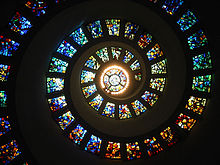
Yes, it's true. And for anyone who knows me, it's hardly a revelation.

- If you're wondering what I'm doing here, at a prayer breakfast, well, so am I. I'm certainly not here as a man of the cloth, unless that cloth is leather. It's certainly not because I'm a rock star. Which leaves one possible explanation: I'm here because I've got a messianic complex.
Yes, it's true. And for anyone who knows me, it's hardly a revelation.
- I'm the first to admit that there's something unnatural... something unseemly... about rock stars mounting the pulpit and preaching at presidents, and then disappearing to their villas in the South of France. Talk about a fish out of water. It was weird enough when Jesse Helms showed up at a U2 concert... but this is really weird, isn't it?
- I will try to keep my homily brief. But be warned — I'm Irish.
- I presume the reason for this gathering is that all of us here — Muslims, Jews, Christians — all are searching our souls for how to better serve our family, our community, our nation, our God.
I know I am. Searching, I mean. And that, I suppose, is what led me here, too.
Yes, it's odd, having a rock star here — but maybe it's odder for me than for you. You see, I avoided religious people most of my life. Maybe it had something to do with having a father who was Protestant and a mother who was Catholic in a country where the line between the two was, quite literally, a battle line. Where the line between church and state was... well, a little blurry, and hard to see.
- One of the things that I picked up from my father and my mother was the sense that religion often gets in the way of God.
For me, at least, it got in the way. Seeing what religious people, in the name of God, did to my native land... and in this country, seeing God's second-hand car salesmen on the cable TV channels, offering indulgences for cash... in fact, all over the world, seeing the self-righteousness roll down like a mighty stream from certain corners of the religious establishment...
I must confess, I changed the channel. I wanted my MTV.
Even though I was a believer.
Perhaps because I was a believer.

- It is such an important idea, Jubilee, that Jesus begins his ministry with this. Jesus is a young man, he's met with the rabbis, impressed everyone, people are talking. The elders say, he's a clever guy, this Jesus, but he hasn't done much... yet. He hasn't spoken in public before...
When he does, his first words are from Isaiah: "The Spirit of the Lord is upon me," he says, "because He has anointed me to preach good news to the poor." And Jesus proclaims the year of the Lord's favour, the year of Jubilee. [Luke 4:18]
What he was really talking about was an era of grace — and we're still in it.
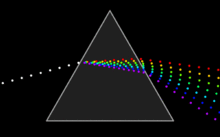

- Look, whatever thoughts you have about God, who He is or if He exists, most will agree that if there is a God, He has a special place for the poor. In fact, the poor are where God lives.
Check Judaism. Check Islam. Check pretty much anyone.
I mean, God may well be with us in our mansions on the hill... I hope so. He may well be with us as in all manner of controversial stuff... maybe, maybe not... But the one thing we can all agree, all faiths and ideologies, is that God is with the vulnerable and poor.
God is in the slums, in the cardboard boxes where the poor play house... God is in the silence of a mother who has infected her child with a virus that will end both their lives... God is in the cries heard under the rubble of war... God is in the debris of wasted opportunity and lives, and God is with us if we are with them.

He said, stop asking God to bless what you're doing.
Get involved in what God is doing — because it's already blessed.
- I close this morning on … very... thin... ice.
This is a dangerous idea I've put on the table: my God vs. your God, their God vs. our God... vs. no God. It is very easy, in these times, to see religion as a force for division rather than unity.
And this is a town — Washington — that knows something of division.
But the reason I am here, and the reason I keep coming back to Washington, is because this is a town that is proving it can come together on behalf of what the Scriptures call the least of these.
This is not a Republican idea. It is not a Democratic idea. It is not even, with all due respect, an American idea. Nor it is unique to any one faith.
"Do to others as you would have them do to you." [Luke 6:30] Jesus says that.
"Righteousness is this: that one should... give away wealth out of love for Him to the near of kin and the orphans and the needy and the wayfarer and the beggars and for the emancipation of the captives." The Koran says that. [2.177]
Thus sayeth the Lord: "Bring the homeless poor into the house, when you see the naked, cover him, then your light will break out like the dawn and your recovery will speedily spring fourth, then your Lord will be your rear guard." The Jewish scripture says that. Isaiah 58 again.
- A number of years ago, I met a wise man who changed my life. In countless ways, large and small, I was always seeking the Lord's blessing. I was saying, you know, I have a new song, look after it... I have a family, please look after them... I have this crazy idea...
And this wise man said: stop.
He said, stop asking God to bless what you're doing.
Get involved in what God is doing — because it's already blessed.
- These goals — clean water for all; school for every child; medicine for the afflicted, an end to extreme and senseless poverty — these are not just any goals; they are the Millennium Development goals, which this country supports. And they are more than that. They are the Beatitudes for a Globalised World.
- There is a continent — Africa — being consumed by flames.
I truly believe that when the history books are written, our age will be remembered for three things: the war on terror, the digital revolution, and what we did — or did not to — to put the fire out in Africa.
History, like God, is watching what we do.
Bono: The Rolling Stone Interview (2017)
[edit]
- These last two albums mix up the personal and the political so that you don't know which one you're talking to. That's a kind of magic trick, and realizing that of course all the problems that we find in the exterior world are just manifestations of what we, you know, what we hold inside of us, in our interior worlds. The biggest fucker, the biggest asshole, the biggest, the most sexist we can be, the most selfish, mean, cunning, all those characters you are going to see them in the mirror. And that is where the job of transformation has to start first. Is that not what experience tells us?
- I'm less unsure about taking political risks or social risks. When I became an activist, people were like, "Really?" But they eventually accepted that. Then I started to be interested in commerce and the machinery of what got people out of poverty and into prosperity. And then a few people said, "You can't really go there, can you?"
I said, "But if you are an artist, you must go there." You and I have had the conversation over the years: What can the artist do? What is the artist not allowed to do, and are there boundaries? Now, I would say to my younger self: "Experiment more and don't let people box you in. There is nothing you can't put on your canvas if it is part of your life."
- I met this poet named Brendan Kennelly. I have known him for years; he is an unbelievable poet. And he said, “Bono, if you want to get to the place where the writing lives, imagine you’re dead.” There is no ego, there is no vanity, no worrying about who you will offend. That is great advice.
- [On the persecutions of Rohingya in Myanmar, and Aung San Suu Kyi's lack of response to them] That is very hard, and I'm – I feel kind of nauseous about that. I have genuinely felt ill, because I can't quite believe what the evidence all points to. But there is ethnic cleansing. It really is happening, and she has to step down because she knows it's happening. I am sure she has many great reasons in her head why she is not stepping down. Maybe it's that she doesn't want to lose the country back to the military. But she already has, if the pictures are what we go by, anyway. The human rights that are being torched, the lives that are being burned out in Rakhine State are more important than a unity without them. … She should, at the very least, be speaking out more. And if people don't listen, then resign. This is all just really troubling. I am still confounded by it, actually. I am still confounded by it, actually. … Is it that we project onto people who we want them to be? We find somebody we like, and we tell ourselves that a person exists that is better than us. More able than us. A truer moral compass than us. We imbue them with all these qualities. We do that with people. I think I have had it done to me. People have their version of you, they project what they want to see on you. Maybe she was always a politician. She was not a saint. She was not some sort of savior. Maybe we were always wrong, and we just have to accept we were wrong. Or maybe something terrible has happened to her that we just don't know.
Quotes about Bono
[edit]- You have made people listen. You have made people care, and you have taught us that whether we are poor or prosperous, we have only one world to share. You have taught young people that they do have the power to change the world.
- Kofi Annan, UN Secretary General, to Bono. (November 1999)
- He's a poet. He's a philosopher. And last night, I think I saw him walking on water.
- Mick Jagger (1999)
- I never believed that U2 wanted to save the whales. I don't believe that The Beastie Boys are ready to lay it down for Tibet.
- I think that politicians are attracted at first by the celebrity but once they meet him, they find that he is outstandingly capable.
- Jeffrey Sachs, Head Economist for the UN Millenium Development Goals. (1999)
- He's a strange sort of entity, this euphoric rock star with the chin stubble and the tinted glasses — a new and heretofore undescribed planet in an emerging galaxy filled with transnational, multinational and subnational bodies. He's a kind of one-man state who fills his treasury with the global currency of fame. He is also, of course, an emanation of the celebrity culture. But it is Bono's willingness to invest his fame, and to do so with a steady sense of purpose and a tolerance for detail, that has made him the most politically effective figure in the recent history of popular culture.
- Bono gives us a vision of how tomorrow can be better than today. He appeals to something greater than ourselves. He tells the story of his life and struggles in terms everyone can understand. He speaks about faith in a way that even a nonbeliever can embrace.
- Jann S. Wenner in Rolling Stone magazine, No. 986 (3 November 2005)
- For being shrewd about doing good, for rewiring politics and re-engineering justice, for making mercy smarter and hope strategic and then daring the rest of us to follow, Bono is Time's Person of the Year.
- Time magazine (2005)
External links
[edit]- @U2 - U2 tribute site
- Three chords and the Truth - U2 tribute site
- U2 Wanderer - U2 tribute site
- An Cat Dubh - U2 tribute/multimedia site
- U2 Song index at Frog Circus
- U2MoL - The Meaning of U2 Lyrics
- Streaming audio interview with Bono and The Edge from 1983 - Classic Rock Central

